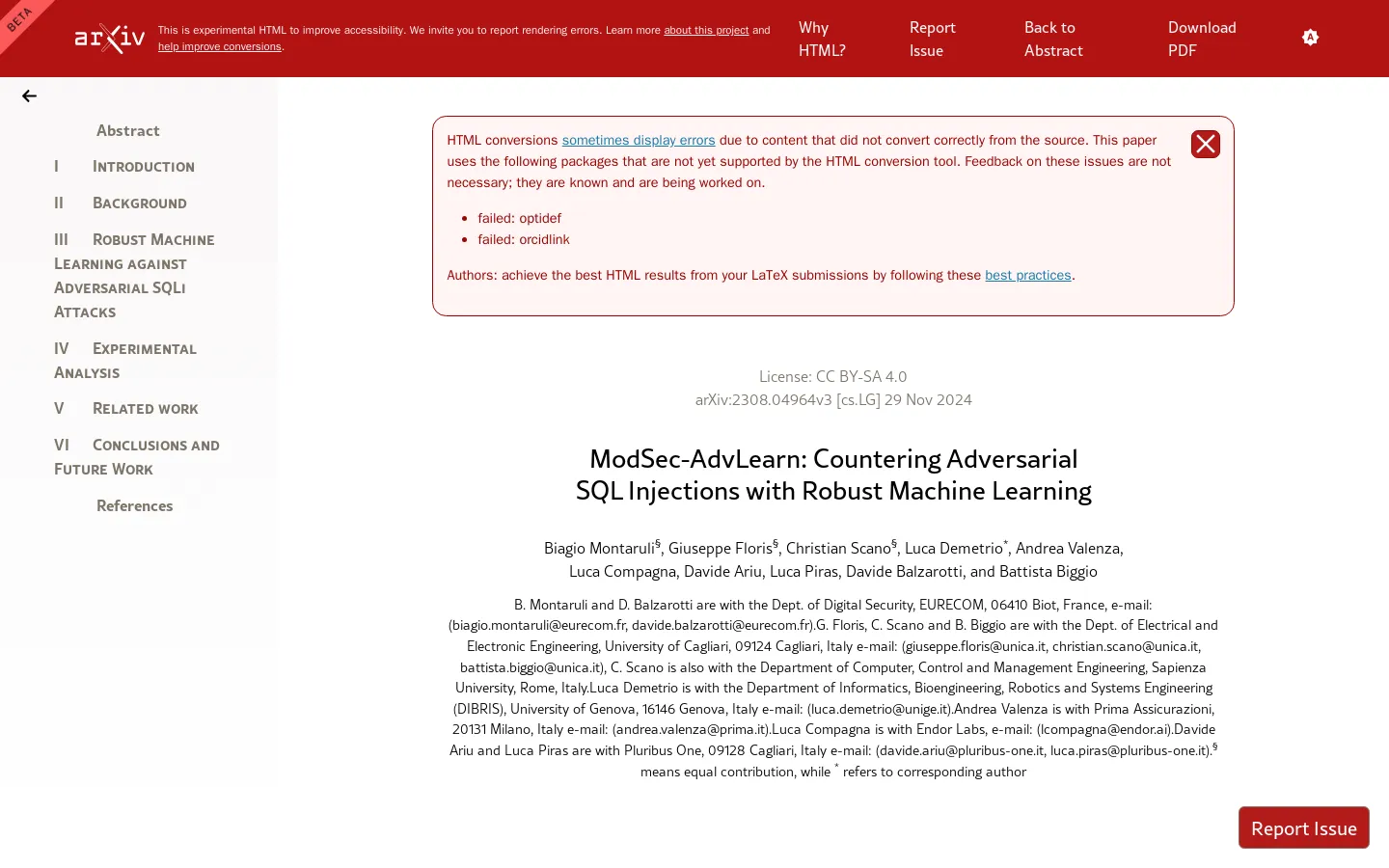
New Tutorial Enhances Web Application Firewall Security Against SQL Injections
/ 4 min read
Quick take - A new tutorial has been launched to enhance Web Application Firewall (WAF) security against SQL injection attacks through advanced techniques and open-source collaboration, aiming to improve robustness and foster community innovation in cybersecurity.
Fast Facts
- A new tutorial has been launched to enhance Web Application Firewalls (WAFs) against SQL injection (SQLi) attacks through adversarial training and open-source collaboration.
- The tutorial aims to increase WAF robustness by providing cybersecurity professionals with advanced techniques to identify and neutralize sophisticated threats.
- Developers will release the open-source module ModSec-AdvLearn to promote collaboration and reproducibility in cybersecurity research.
- The initiative is expected to significantly reduce successful SQLi attacks, protecting sensitive data and improving web application integrity.
- Key recommendations for enhancing WAF effectiveness include using tools like ModSecurity, OWASP Core Rule Set, and WAF-A-MoLE, along with regular updates and staff training.
Advancements in Web Application Firewall Security: A New Tutorial for Enhanced Protection
In the ever-evolving landscape of cybersecurity, web application firewalls (WAFs) play a crucial role in safeguarding sensitive data from malicious attacks. A new tutorial has been launched to address the growing threat of sophisticated SQL injection (SQLi) attacks, offering advanced techniques to bolster WAF defenses. This initiative not only aims to enhance the robustness of WAFs through adversarial training but also promotes open-source collaboration within the cybersecurity community.
Increasing Robustness Against Adversarial Attacks
The primary focus of the tutorial is to implement adversarial training methods that specifically target SQLi attacks. These attacks exploit vulnerabilities in web applications, often bypassing existing detection mechanisms. By equipping cybersecurity professionals with advanced tools and knowledge, the tutorial seeks to fortify defenses against such threats. This proactive approach ensures that WAFs can effectively identify and neutralize threats posed by malicious actors employing sophisticated tactics.
Promoting Open-Source Collaboration
Beyond technical enhancements, the tutorial emphasizes collaboration within the cybersecurity research community. The developers plan to release the open-source code for their new module, ModSec-AdvLearn. By making this resource available, they aim to encourage reproducibility in research and foster an environment where experts can innovate and improve upon existing solutions. This open-source initiative is expected to drive further advancements as researchers and practitioners share findings and enhancements based on their experiences with the code.
Implications for Cybersecurity
The implications of this tutorial extend beyond mere technical improvements. By advancing WAF robustness and promoting open-source collaboration, it could significantly reduce successful SQLi attacks, thereby protecting sensitive data and maintaining web application integrity. The emphasis on adversarial training reflects a growing recognition within the cybersecurity community of the need to anticipate and counteract increasingly sophisticated attack strategies. Furthermore, the open-source release of ModSec-AdvLearn is poised to create a more interconnected and resourceful cybersecurity landscape.
Essential Steps from the Tutorial
-
Preparation: Gather all necessary materials and tools before starting the project. This includes both main components and supplementary items that may enhance outcomes.
-
Execution: Follow step-by-step instructions carefully, ensuring accuracy at each stage to prevent complications later.
-
Testing: Conduct thorough testing after initial assembly to identify any issues needing resolution before proceeding.
-
Finalization: Complete final touches by cleaning up rough edges and ensuring everything is in its right place for optimal functionality.
By adhering to these steps, organizations can enhance their WAFs’ effectiveness against SQLi attacks and other web-based threats. Regular updates and maintenance of WAF configurations are crucial, including staying informed about the latest vulnerabilities and trends in web security.
Avoiding Common Pitfalls
When using WAFs, particularly with the OWASP Core Rule Set (CRS) for SQLi detection, users should be aware of common pitfalls that can impact effectiveness:
-
Default Rule Sets: Relying solely on default rules without customization can lead to false positives or negatives.
-
Logging and Monitoring: Proper logging is essential for gaining insights into traffic patterns and refining WAF configurations over time.
-
Regular Updates: Failing to update rule sets leaves applications vulnerable as threat landscapes evolve.
Recommended Tools and Resources
-
ModSecurity: An open-source WAF solution for filtering HTTP traffic with customizable rules tailored to specific security needs.
-
OWASP Core Rule Set (CRS): Provides generic attack detection rules for use with ModSecurity, quickly fortifying WAFs against common vulnerabilities.
-
WAF-A-MoLE: Offers an advanced machine learning engine for detecting web application attacks, enhancing threat detection capabilities.
-
ModSec-AdvLearn: Focuses on advanced learning techniques to improve ModSecurity’s performance by refining detection rules.
Incorporating these tools into your security framework strengthens defenses against SQLi attacks while ensuring a proactive approach to web application security. Regular updates, monitoring systems, security audits, penetration testing, and staff training are essential components of a robust security posture that safeguards critical web applications from evolving cyber threats.



